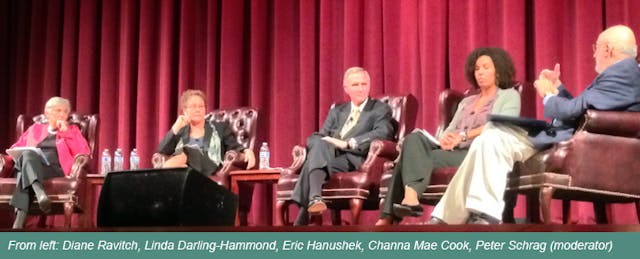The “Reign of Terror” in late 18th century France brings to mind issues of violence and conflict between rival political parties. According to Diane Ravitch, the American education system and hyped-up “education reform” is riddled with a “reign” of issues all its own--except in this case, the biggest issues are misrepresentations of data, and disconnect between federal law and public school realities.
On September 30, educators, Stanford Graduate School of Education students, and local Palo Alto residents gathered to hear researcher and former Assistant Secretary of Education Diane Ravitch speak on the central points of her recently-published book Reign of Error: The Hoax of the Privatization Movement and the Danger to America’s Public Schools. The speech was followed by a panel of speakers addressing the various themes brought up in Ravitch’s book, which included Eric Hanushek (Hoover Institution) and Linda Darling-Hammond (Stanford Graduate School of Education).
Ravitch spoke on a variety of topics regarding the “hoaxes” of education reform she presents in her book, touching on quick-fix approaches from No Child Left Behind to the educational technology movement. But several themes made themselves apparent both during her speech and the panel discussion, when Hammond and Hanushek weighed in with their thoughts.
1. The Realities of Assessment and Test Scores
Testing was a common topic in Ravitch’s book--and a source of slight consternation between Ravitch and Hanushek. Ravitch argued against the legitimacy of statements about America’s low performance on international tests, identifying that NAEP scores this past year were the highest they’ve ever been for white, black, Latino, and Asian students alike. She also addressed the treatment of testing as a panacea for the public education’s issues, and cited the federal government’s involvement in this as problematic. Ravitch called Race to the Top a testing battle “where there are winners and losers,” when we should strive to never have “losers” in public education.
Ravitch, however, did come under some fire when Hanushek (whom moderator Peter Schrag referred to at one point as “Mr. Value-Added”) cited data from international PISA scores where US students scored relatively lower. Hanushek also identified that NAEP failed to include a number of developed countries in its testing scheme.
During the Q&A, one audience member asked why there was such a focus on testing during Ravitch’s speech and the panel discussion, underscoring Ravitch’s point that America’s current “obsession with standardized testing [has] gone overboard.”
2. Quick-Fix Teacher Changes Don’t Fix
Claps and nods filled the auditorium when Ravitch addressed the “quick fixes” to the “bad teacher” issue. Hoaxes spanned the spectrum in this category, such as firing teachers (“You can’t fire your way to Finland”), abolishing tenure, merit pay for higher test scores, and getting rid of unions. Ravitch and Darling-Hammond agreed during the panel that the majority of these quick fixes would create a multitude of other issues, such as an abolishment of tenure.
This theme also addressed issues with teacher feedback mechanisms as it relates to edtech; a moment of particular note was when Ravitch addressed Bill Gates’ $5 billion plan to videotape teachers for evaluation. “Bill Gates said we won’t know the results for about a decade,” Ravitch said, to which the audience responded less than favorably.
3. Educational Technology Won’t Solve Everything
A third theme (less of a focus but nevertheless noticeable) related to hoaxes regarding online schools and the use of technology in the classroom. Ravitch conceded that she believed in school customization and student learning personalization that edtech offers. However, she followed up with, “A lot of tech people think they can replace real teachers,” which she wholeheartedly disagreed with.
To back up her beliefs, Ravitch identified the high dropout rates in online schools, as well as the recent issues surrounding the $1 billion iPad roll-out in the Los Angeles Unified School District. “In time, we will figure this out,” Ravitch said. But at this point in time, Ravitch argues edtech is not the ultimate reform solution.
4. Poverty is the Real Killer
The theme of poverty underlay the majority of the event, with Ravitch and Darling-Hammond both referring to it as the real crisis of the American education system. Racial segregation and socioeconomic disparities were referred to on several occasions.
While Ravitch has been criticized in the past for her identification of problems over solutions, her call to eliminate the high financial disparities in this country was undeniable during her speech. While refraining from offering hyper-specific solutions, she called for more general changes like universal pre-K education, reduced class sizes, limited usage of testing, and charter-public school partnerships.
So where does edtech fit into this call to arms? Is edtech just a hoax, or can it be wielded as a tool to support the greater masses of American students? You be the judge.


